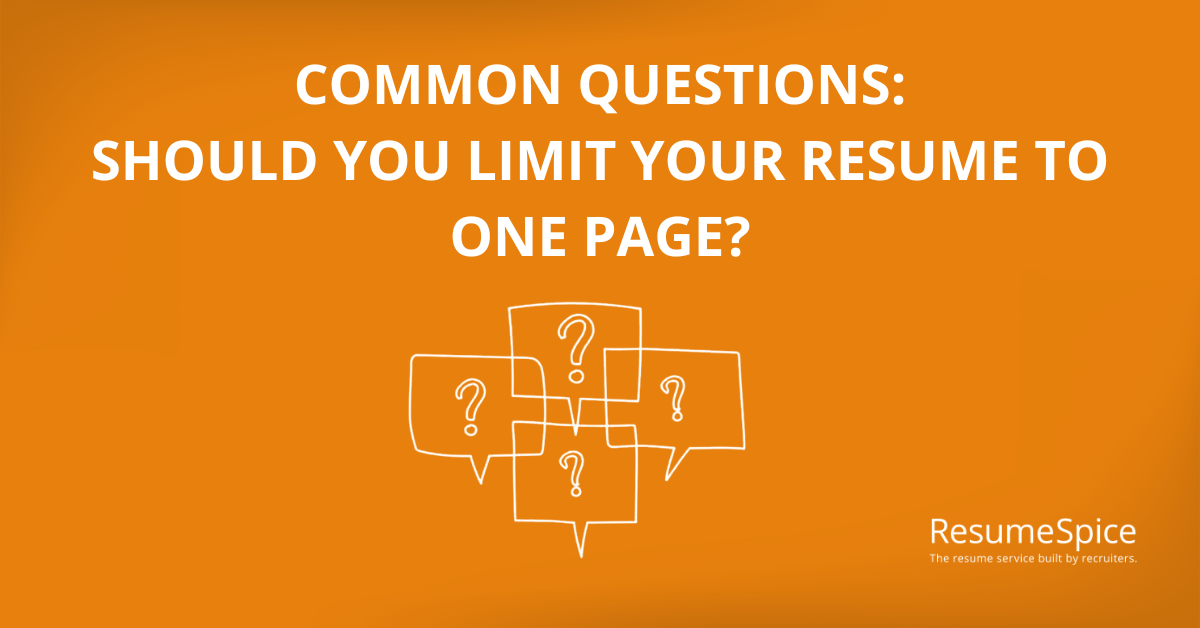Should You Limit Your Resume to One Page?

The proper length of the modern resume is a topic that leaves many professionals divided, and active job seekers potentially unsure of best practices. Is it better to cut out information for the trade off of conciseness? Or opt for multiple pages and capture a more accurate representation of your job experience? In this blog, we are going to directly explore whether you should limit your resume to one page, and provide clear guidelines on when to be concise and when to elaborate on your professional resume.
Key Takeaways
- A one-page resume is perfect for making a quick, powerful impression, but can potentially limit those with extensive experience who might need more space to articulate expertise.
- It’s appropriate to have a two-page resume (and in rare cases, three) if you have a decade or more of experience, or if you’ve had significant roles that need more room for details.
- When writing a resume, focus on relevant information from the last 10 years, tailor it specifically to the job, abide by ATS best practices, and optimize space with professional formatting.
One-Page Resume: Pros and Cons
The one-page resume is a snapshot of your professional story, designed to encapsulate your skills, experiences, and qualifications succinctly on a single page. Think of it similarly to how you may approach your elevator pitch, it should be impactful and able to grab the recruiter’s attention and highlight your professional journey in a nutshell. Crafting a high-quality resume that fits on one page can be a game-changer in today’s fast-paced, competitive job market.
Advantages
Picture a recruiter with hundreds of resumes in front of them, sending each one through the applicant tracking systems, ATS, which scan your document for specific skills and qualifications. Only a handful of resumes will make it through the ATS successfully, and from there, your resume will have only a few seconds of screen time to impress the recruiter. A concise one-page resume with the right experience clearly outlined can be a game changer. It’s about making a strong first impression, capturing the recruiter’s attention within that critical six-second window.
Disadvantages
Although a one-page resume can make a quick impact, resume length is not always a one-size-fits- all. Limiting the resume length of a job seeker with extensive experience and accomplishments may not allow them to effectively articulate the extent of their knowledge and background. In the case of someone with an extensive background, it may be to their benefit to craft additional resume pages, fully conveying what they bring to the table.
Multi-Page Resume: When It's Appropriate
For professionals with over a decade of experience, or those with diverse skill sets, a two-page resume can be the better avenue to convey the full breadth of their expertise. Multiple resume pages can give more room to detail relevant experiences and major projects that could showcase how you are a great match for the desired role.
Senior professionals and job seekers returning to the workforce may also benefit from a two-page format. In cases where employment gaps exist, a two-page resume (and in rare cases, three) allows for inclusion of volunteer roles, portraying a continuous commitment to professional development.
✨Tip: If your resume content is well-aligned with the job requirements and well articulated, a two-pager can be just as effective as a single page resume.
Creating an Effective One-Page Resume
Creating an effective one-page resume is like crafting a compelling narrative. It should be a high-level summary of your accomplishments that captivates the hiring manager’s interest, focusing on specific achievements and avoiding excessive and irrelevant details. It’s about making strategic choices on what to include and what to leave off that directly relate to your targeted position.
Tailoring Your Resume
Tailoring your resume to each job you are applying to is a great way to increase your chances of passing the ATS system, and getting the chance to stand out to the hiring team. Where applicable, you should use the exact wording from the job description to ensure the ATS system locks in your match. The more key words, phrases, and skillsets that you have on your resume that connect to the job description, the more your resume will be pushed to the top of the rankings.
✨Tip: Stray away from using one generic resume for all job applications, as this is much less effective and will likely land you less interviews.
Opting to tailor your resume to the desired role creates commonalities between what the company said they are looking for and what you bring to the table- showcasing that you are potentially a strong match for the position. Making this impactful first impression will generally increase your odds of landing an interview, where you can then dive into further detail on your alignment and proficiencies needed for the role.
✨Tip: When used the right way, Chat GPT can be helpful when looking to match specific job descriptions to your resume. Check out our blog, Should you use Chat GPT to Write Your Resume, for do’s and don’ts when working with Chat GPT.
Prioritizing Relevant Information
With only one page to showcase your skills and experience, prioritization is key. Be sure to focus on the following:
- Focus on your most recent professional experiences, noting no more than the last 10 years of experience, or just a few years if you have less experience.
- Highlight key metrics and numbers around your accomplishments to demonstrate your impact and value.
- Ensure to showcase any leadership roles or significant projects that illustrate your capabilities and experience.
- Include specific skills and expertise that align closely with the job description to pass the ATS system.
- Emphasize any awards or recognitions that can set you apart from other candidates.
Prioritizing relevant information and experience will help you create a concise and effective single-page resume, increasing the likelihood that you land on the first page of potential employers’ considerations.
✨Tip: Want to ensure your resume is checking all the boxes? Learn more about how to find a certified resume writer.
Optimizing Format and Design
Optimizing the format and design of your resume is an important step that can further differentiate you from your competition. Below we are going to outline the best resume formatting practices to increase your chances of making it through the ATS system with ease.
Top-line best practices:
🔶 Font Size: Use a font size between 10 and 12 points for the main text to ensure readability.
🔶 Avoid Complex Formatting: Stick to simple bullet points, and avoid tables, text boxes, and graphics.
🔶 Standard Headings: Use common headings like “Work Experience,” “Education,” “Skills,” etc.
🔶 Consistent Formatting: Ensure consistency in font usage, bullet points, and spacing.
ATS-specific font recommendations:
- Arial
- Calibri
- Helvetica
- Times New Roman
- Georgia
- Verdana
Once formatted for the ATS system, further adjust your resume if needed by:
- Manipulating margins to increase space without compromising readability.
- Experimenting with different font sizes and styles that maintain professionalism while fitting more content per line.
- Using bullet points, preferably 1-2 lines each, to contribute to a cleaner and more space-efficient presentation.
- Incorporating columns to create a balanced layout that guides the reader’s eye.
- Adjusting line spacing to ensure the document doesn’t appear cluttered.
- Choosing a clear hierarchy with bold headings to distinguish sections easily.
✨ Tip: You can save valuable space by omitting the ‘references available upon request’ section – hiring managers assume they’re available if needed.
Resume Length: Industry-Specific Considerations
Although there are general best practices for resume writing, resume length should match industry expectations. Take US federal government jobs, for instance. Applicants are expected to present a federal resume that can range from 3 to 7 pages to include all necessary details.
Then, there’s academia. Particularly in the sciences, an academic CV will typical extend beyond two pages and sometimes up to 15 pages to encompass the full range of an academic’s contributions.
And let’s not forget senior-level managers with extensive accomplishments, or positions requiring a detailed list of relevant professional achievements, such as:
- Publications
- Speaking engagements
- Professional courses
- Licenses
- Certifications
In these cases, a three-page or longer resume may be appropriate.
✨Tip: Browse our list of the top 5 executive resume writing services to guarantee you are meeting your industry standards and senior-level expectations.
Summary
The one-page vs. multi-page resume debate isn’t about one size fitting all. It’s about tailoring your resume to your specific career stage, the role you’re applying for, and the industry you’re in. Remember, the golden rule is to focus on the quality and relevance of your content, because that’s what really matters.
Q&A
Can a resume ever be more than two pages?
Yes, for US federal government jobs and academia, a resume can be more than two pages. Keep it concise and relevant.
How can I fit all my information into a one-page resume?
To fit all your information into a one-page resume, prioritize your most relevant experiences, keep the bullet points per job to a minimum, and optimize the format and design. This will ensure a concise and well-presented document.
Is it necessary to tailor my resume for each job application?
Yes, it’s crucial to tailor your resume for each job application to show a good fit for the role and emphasize relevant skills.
Are there any common misconceptions about resume length?
Don’t fall for the one-page rule for new graduates or the idea that longer resumes are better for experienced professionals. In fact, many grads have successfully used two-page resumes. It’s important to tailor the length of your resume based on your experience and achievements.
Think you may benefit from professional resume writing?
We are here to help! Our dedicated team here at ResumeSpice may be known for being the #1 rated resume writing service in the US, but we do much more than that. Our team is here to help you feel confident in yourself and your skillset and totally prepared to stand out in the job market. From helping guide you in building out your personal brand, to working with you on customized interview prep, tailored career coaching, professional LinkedIn profile writing, and more, we are your resource! Check out all of our career services here, and give us a call at 832.930.7378 or connect with us online.









